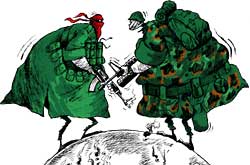 Except for the capital Valley, the Maoists hold sway directly and indirectly over much of the country. Army officers regularly receive phone threats and move around in civvies when they venture out of the barracks. Government vehicles all have private red plates. Public buses run only if the Maoists allow them to, and the main highways can be cut off at any time.
Except for the capital Valley, the Maoists hold sway directly and indirectly over much of the country. Army officers regularly receive phone threats and move around in civvies when they venture out of the barracks. Government vehicles all have private red plates. Public buses run only if the Maoists allow them to, and the main highways can be cut off at any time. The army launched a major operation in the Maoist heartland of Rukum, but the Maoists refused to be dragged into a frontal battle. In fact, they have left the midwest and fortified the east and the tarai where they were traditionally weak. They are now numerically capable of capturing and holding a tarai town. Geo-strategically, the Maoists have moved to what they call the 'Strategic Offensive' phase.
Prachanda's repeated calls for UN mediation is part of a strategy to neutralise any future move by international powers to be directly involved in supporting the Nepali state in a future guerrilla blitzkrieg. Another political weapon is the demand for a constituent assembly, which allows the Maoists to wrap themselves in a democratic cloak. The rebel strategy is to make these two demands vociferously while they take forward their military plans and use the palace-party polarisation to their advantage.
The Maoists are hoping to jump directly from rural guerrilla war to an urban uprising by skipping the conventional war part, and replacing it with their campaign of blockades to strangle the state. With their carefully calibrated blockades, they are testing the waters to see if public frustration and anger can be turned against the state. If it works, they may launch a series of major offensives and hope that the people will join in a mass uprising. So far it looks like the blockades spread misery and inconvenienced a lot of people, nothing more.
Even so, the fact that the state military machine has been unable to thwart the Maoist advance can be seen as proof that the Royal Nepali Army is still in defensive mode. Prachanda's statement last week analyses the army's strategy to "weaken us and force us to negotiate". This statement is uncannily similar to what the head of the Western Division, Gen Rukmangat Katuwal said recently: "Our aim is to disarm the Maoists and bring them back to the mainstream."
But remaining defensive after two-and-half years can be interpreted as a kind of defeat for the army. It follows from this that the king is also on the political defensive. Squeezed militarily by the Maoists and politically by the parties, the king is trying to consolidate his power by picking off the parties and the Maoists one by one. After all, his longterm threat is from the Maoist revolution, and the students' anti-monarchy slogans on the streets are built on the republican seeds planted by the Maoist 'people's war'.
If the Maoist 'Strategic Offensive' is on a militarily decisive phase, their next attacks can be expected to be daring and dramatic.
Translated from the Nepali original in Himal Khabarpatrika.



